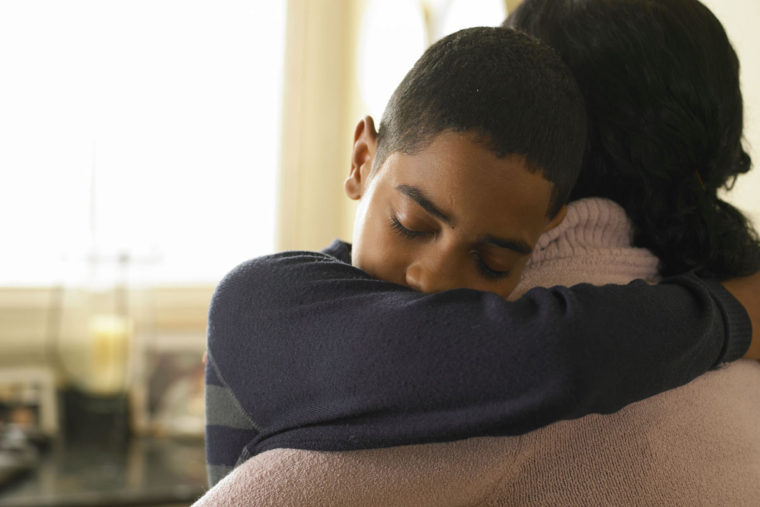A program aimed at helping abused and neglected children and their families is improving outcomes for kids and providing children with stable home environments as their cases move through the courts.
The five-year-old program is for children and families whose cases ended up in St. Louis County Family Court. Researchers at Washington University School of Medicine in St. Louis have found that kids whose families received psychiatric help and educational support during the years since the program began have better-than-expected outcomes compared with kids who faced comparable levels of risk and whose cases went through the court system before the program was launched.
The findings are published in the June issue of The American Journal of Psychiatry.
“Abuse and neglect are linked to some of the worst outcomes in life,” said Washington University child psychiatrist John N. Constantino, MD, who authored the publication and oversees the program. “But if the abuse is halted and addressed after a first incident, the children, on average, aren’t at significantly greater risk than anyone else for poor outcomes later in life. We began this program to help kids who are in protective custody as a result of abuse to ensure they aren’t abused again and to improve the odds that their families will stay on a safe and healthy path.”
One in eight children in the United States will be a victim of abuse or neglect, increasing the risk for psychiatric disorders, substance abuse, suicide, becoming an abusive adult and a host of other negative outcomes, especially if there are multiple incidents of reported maltreatment.
To help prevent further episodes of childhood abuse and neglect, Constantino and his colleagues in the Division of Child Psychiatry — Neha Navsaria, PhD, and Mini Tandon, DO — have been working with St. Louis County Family Court since 2011 to provide two-generation psychiatric care and parenting education to families involved in maltreatment cases. The team found that children who participated in the project are at lower risk of future abuse and neglect and that they make greater progress emotionally and developmentally than expected, and more progress than children who were involved in the court system before the project was initiated.
“Through this collaboration, we have been able to provide educational and psychiatric services that would not have been available to the families otherwise,” said Constantino, the Blanche F. Ittelson Professor of Psychiatry and Pediatrics. “And those services have had a profound impact.”
The program, called the SYNCHRONY Project (Strengthening Young Children by Optimizing Family Support in Infancy), is based on a similar program created several years ago by a child psychiatry group at Tulane University, and is funded by the St. Louis County Children’s Service Fund, a sales-tax fund.
The Washington University psychiatrists followed 119 children from 106 families. The kids’ ages ranged from only a few months to 5 years. All had been placed in protective custody due to substantiated cases of abuse or neglect.
If the court determined there were unmet mental health needs the system couldn’t address, or if it recognized the need for parent training and education, such cases were referred to Constantino’s team.
The project addresses the unmet mental health needs of both generations of a young family, by assessing not only the children, but their parents, as well as the relationship between children and parents. The goal is to implement an approach to intervention that fully encompasses all of the components that can contribute to child abuse and neglect. In more traditional models of care, these different aspects of intervention tend to be fragmented and rarely available as a comprehensive package for struggling families.
Examples of referrals include a case involving a 3-year-old girl who witnessed her father in a protracted episode of rage. After the girl was removed from her home, clinicians identified and successfully treated a psychiatric condition that had affected father for years but had never been addressed, and the family later was reunited.
In another case, the team provided family therapy to a couple whose 2-year-old girl had been sent to live with an aunt due to problems related to severely dysfunctional communication between members of the household. That family later was reunited as well.
Another case involved a 5-year-old boy with anxiety that was precipitated by psychiatric symptoms a parent was experiencing but concealing. Constantino’s team worked toward ensuring the child’s safety, clarifying the magnitude of the parent’s symptoms and creating an opportunity for intervention for the parent, who never had received treatment.

Using standard assessments of psychiatric health and emotional development, the research team found that children in the program experienced significant improvements in the months after referral. The children experienced steady improvement in behavior and adaptive functioning from the time they were enrolled in the project, sometimes months or even years after having been placed in protective custody by the courts.
“These types of gains are one of the most important markers of well-being,” said Constantino, who also directs the William Greenleaf Eliot Division of Child and Adolescent Psychiatry. “The program is identifying unmet needs and allowing kids to get to a better place, either by virtue of improved functioning of their birth parents, careful decision-making about when a home environment is safe, or more appropriate therapeutic or environmental interventions for the children to help them achieve higher levels of behavior and functioning.”
